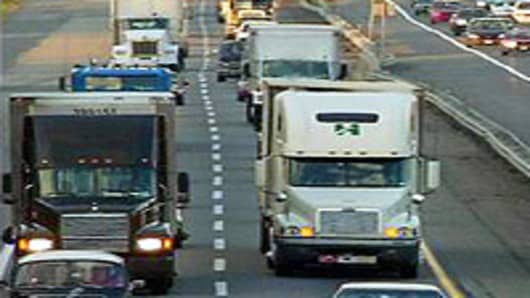As the national unemployment rate remains at 9.6 percent with Friday's jobs report, there's one part of the U.S. economy that is desperate for workers—or rather, drivers.
According to several trade groups in the trucking industry, there could be a shortage of drivers next year, and the estimates range from 200,000 to as many as 500,000.
At first blush, a person might ask: Who can't drive a truck?
But that is part of the problem.
New regulation is entering the industry, and the higher standards will knock some drivers off the road.
On top of that, Baby Boomers are beginning to retire in large numbers. According to shipping giant UPS, it could lose 25,000 drivers to retirement over the next five years alone.
"We are already seeing a contraction in (driver) supply," said Stephens Inc. analyst Jack Waldo, who added that this is more than a short-cycle issue.
"This is a systematic 5-10 year problem."
Another part of the labor shortage is the uptick in demand. As the economy has moderately recovered, so have freight volumes. Businesses need to expand, and that sparks another leg of driver demand.
It also serves as a catalyst for a rise in cost, especially if trucking companies have to actually cut capacity due to a dearth of drivers. Both UPS and FedEx recently raised rates, and according to Dahlman Rose & Co., trucking rates could jump double digits next year.
There is a counterforce here as well. Even though the U.S. jobs picture has not markedly improved, it has not worsened. For many, driving a truck is a last resort. Average salaries are under $40,000, and the job doesn't carry many of the pension benefits it did a generation ago.
However, Waldo says the job profile will soon get better—as the need for drivers spikes.
"I don't think we've spoken to a single truck driver who has said wages will go down in the next 12 months," said Waldo.
Perhaps the biggest take-away, beyond showing a sector full of job opportunities, is the simple fact that as shipping costs filter through the economy, they will ultimately mean higher prices for businesses and for consumers.
If you think this perfect storm for a driver shortage is also a good climate for investing, there are several names to keep in mind. Landstar is a good one to watch because it reports earnings next week and just received an upgrade to buy at Stifel Nicolaus. JB Hunt is a much bigger freight company, and then of course, there are two industry heavyweights UPS and FedEx.


